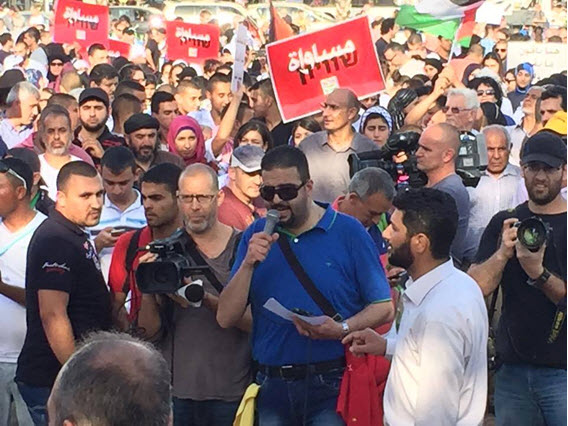Thousands of Palestinian-Arabs, citizens of Israel, gathered in Tel-Aviv’s Rabin Square on Tuesday evening, April 28, to protest against the government’s policy of demolishing homes and other buildings in Arab towns, capping a day in which Arab shops, schools, and businesses observed a general strike.
MK Ayman Odeh (Hadash), head of the Joint List, said that this is one of the most crucial issues confronting the Arab public in Israel. “A family which loses its home, built on its own private land, is shattered,” Odeh said. He accused the government of not responding to initiatives taken by heads of Arab local councils, who have been trying to resolve the issue of master plans for many years.

Raja Zaatry, a member of the Central Committee of the Communist Party of Israel, during the demonstration held in Rabin Square on Tuesday evening to protest against the government’s policy of demolishing buildings in Arab towns (Photo: Al Ittihad)
“Holding a protest in Tel-Aviv is a call to the Jewish public to stand together with the Arab community against the destructive and inciting policies of the Netanyahu government, which is trying to foment a confrontation,” the Higher Arab Monitoring Committee, which organized the rally, said in a statement. “The committee emphasizes that the right to a roof over one’s head is an elementary right of every citizen, which must be respected and met by the state and its institutions.” The committee maintains that the dire housing situation in the Arab sector is due to housing shortages, the confiscation of land, and the non-approval of master plans or plans to expand areas of jurisdiction.
The rally was attended by representatives of all the constituent parts of the Monitoring Committee, Knesset members from the Joint List in the Knesset, which includes Hadash and the Arab parties Balad and Ta’al. Local council heads, social activists and popular committees, and Jewish and Arab intellectuals also participated. Among them were hundreds of Hadash and Communist Party of Israel activists.
In an effort to mobilize more participants, rally organizers declared a general strike in all Arab communities, including the shutting of schools. The response to the call for Tuesday’s strike was considered by organizers as being relatively good in contrast to previous such calls issued by the committee. The location of the rally, in the heart of Tel-Aviv, reflected a new approach by the political leaders of Israel’s Arabs population: If the majority of Israelis ignores the minority and refuses to listen to it, then the minority must come to them.
The crowds also called for recognizing unauthorized communities in the Negev that are predominately populated by Bedouin and which have been a focus of friction with authorities. The committee said that the general strike was called to “raise the cry of the Arab citizens who are suffering from a severe housing crisis, from house demolitions, from land seizures, an absence of jurisdiction expansion, and from the non-approval of master plans.” According to the follow-up committee, presently there are some 50,000 Arab homes facing demolition in Israel. “The government is waging a war on Arabs,” Jeryes Matar, the follow-up committee’s secretary general said at the demonstration. “The battle to save these houses is the battle to save our existence.”
Although Arab Israelis make up around 17 percent of the population, only 4.6 percent of new homes are built in Arab areas, figures provided by Arab rights group Adalah show.
In a February report, Adalah blamed the housing crisis on a “deliberate, consistent, and systematic government policy” that gives preference to development in Jewish areas over Arab ones. In 2014, the Israel Land Authority published tenders for construction of 38,261 housing units in Jewish communities compared with only 1,844 in Arab communities, the report said.
Dr. Yousef Jabareen, a Knesset member from Hadash in the Joint List, said the decision to strike was taken after the second recent home demolition in Dahmash. “We want to tell the new government that we demand our basic rights for housing,” Jabareen told Al-Jazeera, “and we want our voice to be heard in the Jewish community.”
Most Arab-Palestinians in Israel are likely to have shut down their shops and abstained from going to work, and schools were closed for the day, Jabareen said before the demonstration in Tel-Aviv. “We want the government to find a substantial resolution for this issue by broadening the jurisdiction of Arab localities and providing housing options that meet the needs of the Arab communities, especially of young people,” he said.
“It looks like the right-wing coalition will be formed soon,” he added. “The strike is a message to the government: We will not accept being treated as second- or third-class citizens. The new [government] coalition will be a big challenge: we expect to confront more racist legislation and the continuation of incitement against our community.”
Related:


